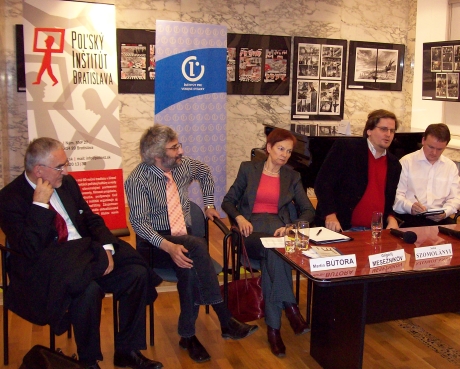On March 3, 2011, the Institute for Public Affairs, in cooperation with the Polish Institute in Bratislava, organized the presentation of the new book Visegrad Elections 2010: Domestic Impact and European Consequences. The main objective of the publication is to provide a reflection on the political, economic and foreign policy implications of the 2010 elections from different angles and perspectives provided by experts from all Visegrad countries.
The premiere was followed by a discussion. Implications of the elections as well as internal and external challenges were discussed by Grigorij Mesežnikov and Martin Bútora (Institute for Public Affairs), and by the co-authors Soňa Szomolányi (Comenius University, Bratislava), Zoltán Pogátsa (Central European University, Budapest) and Ben Stanley (British expert on Polish politics).
In her speech, Soňa Szomolányi presented a general description of the political climate in Central Europe (populism and liberal democracy, civil participation, stability of the system of political parties). Zoltán Pogátsa devoted his talk to political situation in Hungary (changes in political parties, Hungarian EU presidency, foreign politics and relations with Slovakia). Ben Stanley presented the key themes of the presidential elections in Poland (Kaczynski versus Komorowski, political scene before and after elections). Martin Bútora analyzed the cooperation of the Visegrad countries in the European Union, especially in economy and security issues.
The event attracted attention of more than 30 people from the ranks of diplomats, scholars, journalists and students.

Speakers (from the left): Martin Bútora, Grigorij Mesežnikov, Soňa Szomolányi, Zoltán Pogátsa and Ben Stanley